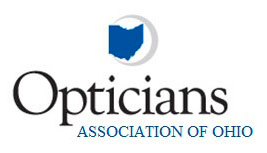What is Opticianry?
What Does an Optician Do?
Opticians are licensed health professionals who fit eyeglasses or contact lenses, using prescriptions written by ophthalmologists or optometrists. Eyewear is the term used for eyeglasses, contact lenses and low vision aids. The profession of opticianry in Ohio is regulated and governed by the Vision Professionals Board to strict standards to protect your vision and ensure licensed opticians provide you the highest standard of care.
When do I need an Optician?
Seeing well is important to our safety, our jobs and our lives.
See your licensed optician any time you notice a change in your vision. Licensed opticians are trained to recognize anything unusual in your eyesight and are able to direct you to the appropriate professional when necessary..
It’s a good idea to have your vision tested regularly. You can see an optician any time you have questions or would like to discuss anything regarding your eyewear or eyesight. Opticians care about your vision and are able to provide you with exactly the right solution for your vision, your personality and your lifestyle.
Once you’ve had your eye exam and your sight tested (by an optometrist or ophthalmologist) get your prescription (it’s the law) and you can take it to a licensed optician of your choice to have your glasses or contact lenses made. You may even be able to have your prescription made right where you had your eyes tested.
Licensed Optician FAQ
The Difference between the OAO and the Licensing Board
The OAO or the Ohio Vision Professional Board?
Opticians make long distance phone calls to the Ohio Professionals Vision Board and the Opticians Association of Ohio everyday. They are commonly, and easily, confusing the telephone numbers when specific information is needed by the optician. There are differences in objectives and purpose of the Opticians Association of Ohio...the statewide association, and the Ohio Optical Dispensers Board...the state government agency.
The Ohio Vision Professional Board is a nine member board of directors appointed by the Governor. They are made up of five dispensing opticians, one optometrist, two public members (one must be a senior citizen) , and one physician who engages in the practice of ophthalmology. They monitor the professional conduct, education and licensing of opticians. They also help implement and enforce the laws and rules that govern the profession in the state.
The Opticians Association of Ohio is a non-profit, statewide organization that represents and promotes opticians and helps protect the interests of the opticians before the legislature and the Board. Its Board of Trustees is made of sixteen voting members and past presidents.
The OAO is an association organized by and for opticians. Members dues make up the operating budget for providing continuing education requirements, networking for opticians through chapters and regular publications, lobbying and legal services, and other valuable member benefits.
When you telephone, make sure you are directing your call to the organization you desire to contact:
- Ohio Vision Professionals Board: 614-466-9709
Questions on: your license, all approved C.E. seminars, state licensing law - Opticians Association of Ohio: (614) 505-3296
Questions on: your membership, OAO Local Division/State


